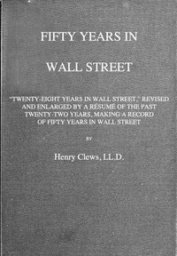

Fifty Years in Wall Street (1908)
by Henry Clews


Stuyvesant Fish.⏎ Son of the late Hon. Hamilton Fish, Governor of the State of New York and Secretary of State in General Grant's Cabinet. Born June 24, 1851, at New York, N. Y. Educated at Columbia College, New York, graduated 1871. Entered railway service October 1, 1871, after which he, up to June 20, 1872, became clerk in the Illinois Central Railroad, New York office; June 20 to October, 1872, secretary to president of same company; November 1, 1872 to December 31, 1874, clerk with Morton, Bliss & Co. at New York, and Morton, Rose & Co. at London; January 1, 1875 to March 15, 1877, managing clerk Morton, Bliss & Co., holding their power of attorney; December 14, 1876 to March 6, 1879, member New York Stock Exchange; March 16, 1876, elected Director Illinois Central Railroad, and appointed treasurer and agent for purchasing committee New Orleans, Jackson & Great Northern Railroad; November 8, 1877, elected secretary Chicago, St. Louis & New. Orleans Railroad; and March, 1882, vice-president Chicago, St. Louis & New Orleans Railroad; January 7, 1883 to April 2, 1884, second vice-president Illinois Central Railroad; April 2, 1884 to May 14, 1887, vice-president; May 18, 1887 to November 7, 1906, president same road; President American Railway Association April 27, 1904 to April 25, 1906; Chairman Seventh Session International Railway Congress, Washington, D. C., May, 1905. Elected Director of the National Park Bank, March, 1883, and so remains; elected a Trustee of the Mutual Life Insurance Company of New York in the year 1888 and continued as such until February 23, 1906, when he resigned. What Mr. Fish did for the Illinois Central Railroad Company while its President, is shown in the following extract from the London Statist, and also in the Annual Reports of the Directors of the Company, which make a marvellous exhibit of Mr. Fish's able and sagacious management during his long rwgime:⏎ The Illinois Central is the most important of the systems running north and south between Chicago and the Gulf of Mexico. At one time its prosperity chiefly depended upon the cotton crop; but although this crop still gives it a large traffic, its prosperity has been built up by the acquisition of a large share of the grain and maize traffic. In the old days corn, or maize, was sent through the Western States for shipment via Boston, New York, and Baltimore, but the Illinois Central has now succeeded in diverting a vast portion of it to New Orleans. It now derives its revenue from carrying a large traffic at low rates in competition both with the Eastern lines and with the water transit of the Mississippi; In recent years the Company has built extensions which now enable it to participate in the coal and iron ore traffic required by or originating in the Birmingham iron district. The Illinois Central has always enjoyed good management. In its early days, when the accepted principle of railway working was to charge high rates and to carry very little traffic, its policy conformed to that of other well-managed undertakings. For the past twenty years its policy has changed; it has sought to render to the public the maximum of service for the lowest possible rate. The success of this policy has exceeded all expectations. In the twelve months to June 30th last the Company carried traffic at a lower rate than ever before, and yet obtained a record profit, both actually and relatively to its capital expenditure. This success has resulted from good management, economy of operation, and economy of capital expenditure.🏁
Global Leaderboard
| # | Player | Time | Duration | Accuracy | WPM | pp | ||
|---|---|---|---|---|---|---|---|---|
| 1 | ||||||||
| 2 | ||||||||
| 3 | ||||||||
| 4 | ||||||||
| 5 | ||||||||
| 6 | ||||||||
| 7 | ||||||||
| 8 | ||||||||
| 9 | ||||||||
| 10 |


Stuyvesant Fish.⏎ Son of the late Hon. Hamilton Fish, Governor of the State of New York and Secretary of State in General Grant's Cabinet. Born June 24, 1851, at New York, N. Y. Educated at Columbia College, New York, graduated 1871. Entered railway service October 1, 1871, after which he, up to June 20, 1872, became clerk in the Illinois Central Railroad, New York office; June 20 to October, 1872, secretary to president of same company; November 1, 1872 to December 31, 1874, clerk with Morton, Bliss & Co. at New York, and Morton, Rose & Co. at London; January 1, 1875 to March 15, 1877, managing clerk Morton, Bliss & Co., holding their power of attorney; December 14, 1876 to March 6, 1879, member New York Stock Exchange; March 16, 1876, elected Director Illinois Central Railroad, and appointed treasurer and agent for purchasing committee New Orleans, Jackson & Great Northern Railroad; November 8, 1877, elected secretary Chicago, St. Louis & New. Orleans Railroad; and March, 1882, vice-president Chicago, St. Louis & New Orleans Railroad; January 7, 1883 to April 2, 1884, second vice-president Illinois Central Railroad; April 2, 1884 to May 14, 1887, vice-president; May 18, 1887 to November 7, 1906, president same road; President American Railway Association April 27, 1904 to April 25, 1906; Chairman Seventh Session International Railway Congress, Washington, D. C., May, 1905. Elected Director of the National Park Bank, March, 1883, and so remains; elected a Trustee of the Mutual Life Insurance Company of New York in the year 1888 and continued as such until February 23, 1906, when he resigned. What Mr. Fish did for the Illinois Central Railroad Company while its President, is shown in the following extract from the London Statist, and also in the Annual Reports of the Directors of the Company, which make a marvellous exhibit of Mr. Fish's able and sagacious management during his long rwgime:⏎ The Illinois Central is the most important of the systems running north and south between Chicago and the Gulf of Mexico. At one time its prosperity chiefly depended upon the cotton crop; but although this crop still gives it a large traffic, its prosperity has been built up by the acquisition of a large share of the grain and maize traffic. In the old days corn, or maize, was sent through the Western States for shipment via Boston, New York, and Baltimore, but the Illinois Central has now succeeded in diverting a vast portion of it to New Orleans. It now derives its revenue from carrying a large traffic at low rates in competition both with the Eastern lines and with the water transit of the Mississippi; In recent years the Company has built extensions which now enable it to participate in the coal and iron ore traffic required by or originating in the Birmingham iron district. The Illinois Central has always enjoyed good management. In its early days, when the accepted principle of railway working was to charge high rates and to carry very little traffic, its policy conformed to that of other well-managed undertakings. For the past twenty years its policy has changed; it has sought to render to the public the maximum of service for the lowest possible rate. The success of this policy has exceeded all expectations. In the twelve months to June 30th last the Company carried traffic at a lower rate than ever before, and yet obtained a record profit, both actually and relatively to its capital expenditure. This success has resulted from good management, economy of operation, and economy of capital expenditure.🏁
